 Petzlover
Petzlover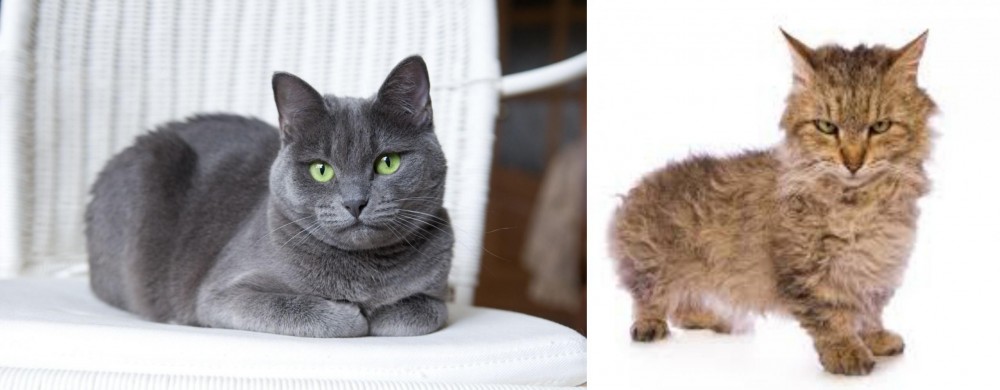 Russian Blue is originated from Russia but Skookum is originated from United States. Both Russian Blue and Skookum are having almost same weight. Russian Blue may live 5 years more than Skookum. Both Russian Blue and Skookum has almost same litter size. Both Russian Blue and Skookum requires Low Maintenance.
Russian Blue is originated from Russia but Skookum is originated from United States. Both Russian Blue and Skookum are having almost same weight. Russian Blue may live 5 years more than Skookum. Both Russian Blue and Skookum has almost same litter size. Both Russian Blue and Skookum requires Low Maintenance.
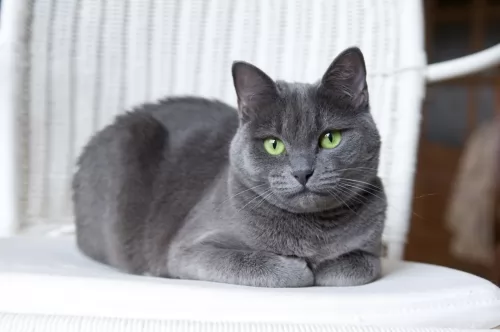 It is believed that this beautiful cat originates from Russia, and more specifically the Archangel Isles.
It is believed that this beautiful cat originates from Russia, and more specifically the Archangel Isles.
It is also thought that these cats descended from cats that were kept by the Russian Czars and that they arrived in England and Northern Europe during the 1860s. It appeared in cat shows and by 1912 it was given its own classification.
The cat was also introduced to the United States in the early 1900s and today it is a popular domesticated pet.
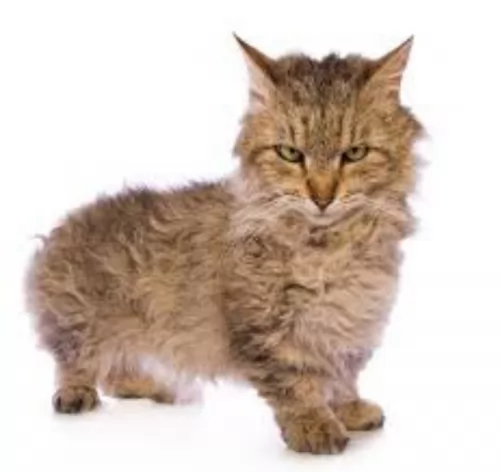 Skookums are a new cat breed – an experimental and rare hybrid dwarf cat breed, It was developed in the United States in the 1990s.
Skookums are a new cat breed – an experimental and rare hybrid dwarf cat breed, It was developed in the United States in the 1990s.
As a new breed, you’re not going to find too much information on their history, but is was breeder Roy Galusha who started crossing the Munchkin cat with the LaPerm.
Even today, some years later, the Skookum cat is still an experimental cat breed that is considered a rare dwarf breed. It is recognized as an Experimental breed by Independent European Registries as well as the Dwarf Cat Association.
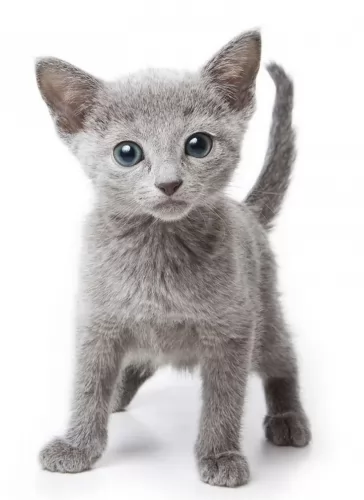 The medium-sized Russian blue cat is slender, strong, and muscular with long legs. He can weigh between 3 and 6kg.
The medium-sized Russian blue cat is slender, strong, and muscular with long legs. He can weigh between 3 and 6kg.
He has a beautiful blue, soft double coat that is short and thick. The coat is an even color with silver tips. What is an attractive feature of this cat too is that his double coat doesn’t shed much. The cat has a triangular-shaped head with yellow to green eyes.
The Russian Blue is such an amicable, sweet-tempered cat that likes nothing more than to be in the company of his human owners, He is calm and independent. They do well living with their human families but they do tend to form a deep bond with that one special person.
He will even follow his owner everywhere and is a loving, loyal companion. The Russian Blue is a social cat but also enjoys some quiet time out just to chill. He also isn’t too fond of visitors and may run away and hide if the occasion becomes too large and noisy.
This is a cat that will miss you when you’re at work all day but he is able to quietly wait for your arrival back home. Then he will appreciate some playtime.
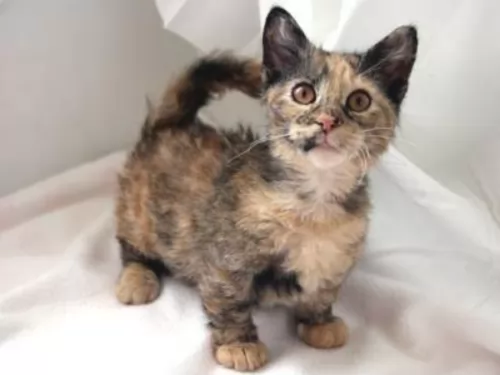 The dwarf Skookum only weighs between 2 and 3kg. It is a new cat breed with a curly coat. The coat can be in a range of colors and patterns.
The dwarf Skookum only weighs between 2 and 3kg. It is a new cat breed with a curly coat. The coat can be in a range of colors and patterns.
It is a small, lightweight cat with short legs and a broad head and stocky build. It has a muscular build. The eyes are large and walnut- shaped while the ears are large and pointed.
The neck is also thickish. The coat is soft and curly, standing away from the body and spiraling into ringlets. It can feature a number of colors and patterns such as solid, bicolor, and colorpoint. These cats can be long-haired or short-haired.
They are playful cats, full of energy and they love climbing and jumping. They’re intelligent, confident cats and are also loyal and loving towards their human family. They may be active, playful cats, but they still like to settle down into your lap.
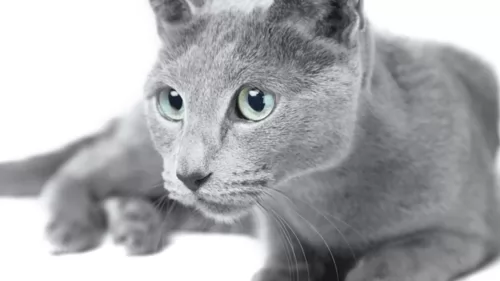 Your Russian Blue is such an intelligent cat and for this reason, when you bring one into your home, you’ll need to provide him with lots of stimulating toys and fun play times.
Your Russian Blue is such an intelligent cat and for this reason, when you bring one into your home, you’ll need to provide him with lots of stimulating toys and fun play times.
This is also a low maintenance cat and a brush once a week will be all that is required.
These are cats that love their mealtimes and you’ll want to work out a special eating program to ensure he gets all the nutrition he needs without over-eating.
Respond with lots of love and attention to your vocal Russian Blue, and you’ll soon see what a precious jewel this cat is as a companion and friend.
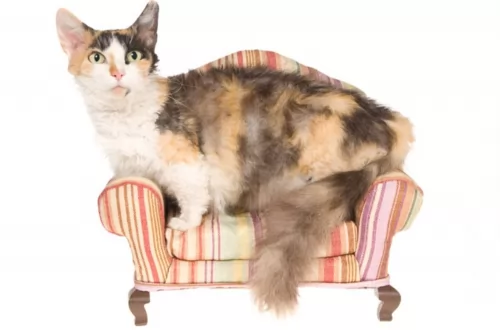 Because the Skookum cat is still in its early stages of development if you want to know precisely what the characteristics of the cat are you would want to look at the Munchkin and the LaPerm cat.
Because the Skookum cat is still in its early stages of development if you want to know precisely what the characteristics of the cat are you would want to look at the Munchkin and the LaPerm cat.
One thing is sure the Skookum cat thrives on the attention of his human family and if you provide him with the love and attention he craves, you can be sure that he will turn out to be the right friend and companion for your family.
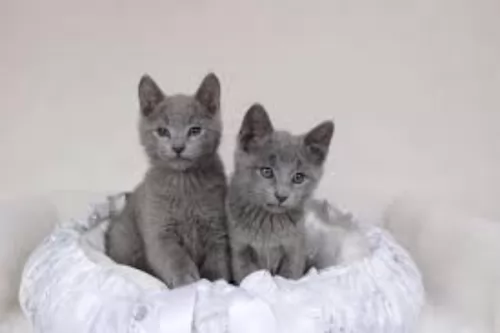 Because the Russian Blue is a naturally occurring breed, they are fairly healthy cats. Watch out for obesity and urinary tract infections with your cat.
Because the Russian Blue is a naturally occurring breed, they are fairly healthy cats. Watch out for obesity and urinary tract infections with your cat.
Obesity shortens a cat’s life. It puts extra pressure on the cat’s joints and it makes them more likely to develop disease. Then again, it is dangerous to suddenly put your obese cat on a strict diet so that he loses weight too quickly.
Your cat requires a gradual decrease in body weight. If you’re worried about your cat’s weight, rather speak to a veterinary surgeon who can explain to you and also draw up a weight loss program for your cat.
Remember too, that cats are carnivores and they simply have to have meat in their diet. Commercially manufactured cat foods of the highest quality are high in protein and low in carbohydrates.
Feline lower urinary tract disease is no joke for a cat. This disease affects your pet’s lower urinary tract – the bladder. Causes include bladder stones or bladder infections and inflammation in the urinary bladder.
You may notice your cat battling to urinate. Your cat will also no doubt cry out while trying to urinate and this is because the process is so painful. There may also be blood in the urine.
You may notice that your cat isn’t using his litter box but urinating elsewhere. Your cat will need to get to the vet as soon as possible. It may not be a life-threatening disease but it can be highly uncomfortable for your cat.
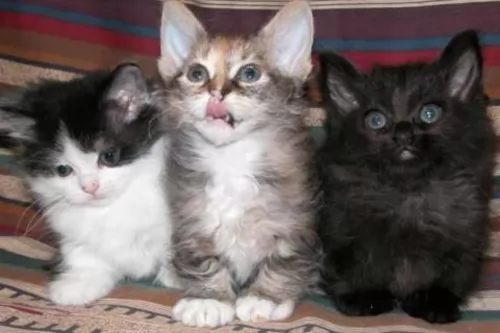 Because the Skookum cat is a new, experimental breed, health problems with the cat are not well known. However, every cat can succumb to some of the common cat health issues there are. As a pet owner you want to watch for and recognize signs that your cat’s health is in trouble.
Because the Skookum cat is a new, experimental breed, health problems with the cat are not well known. However, every cat can succumb to some of the common cat health issues there are. As a pet owner you want to watch for and recognize signs that your cat’s health is in trouble.
Feline leukemia for instance is a disease that spreads through bodily fluids such as urine, saliva and nose discharge, and saliva. Mother cats can even pass the disease along to her kittens. Feline leukemia can also lead to a host of conditions such as diarrhea, respiratory tract infections, skin problems and eye diseases among others.
Feline panleukopenia is known to most people as feline distemper and it is a very contagious viral disease with kittens being most at risk.
The disease affects a cat's immune system and the cat will likely have diarrhea, vomiting and dehydration, and lethargy. It’s a deadly disease that requires a vaccine to prevent it.
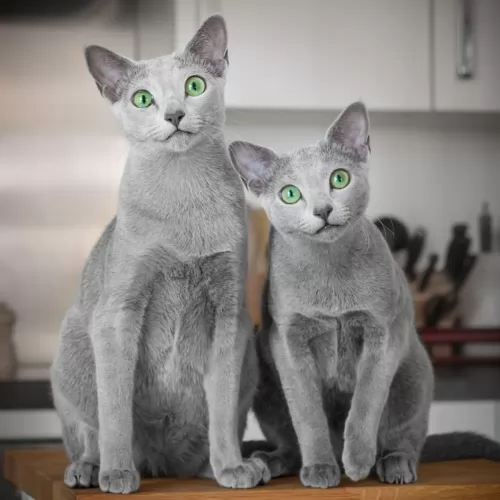 The Russian Blue’s beautiful blue coat is short and thick and will do well with a brush once a week. The cat just thrives on the attention during brush time too.
The Russian Blue’s beautiful blue coat is short and thick and will do well with a brush once a week. The cat just thrives on the attention during brush time too.
Trim your Russian blue’s nails regularly.
Provide your cat with everything he needs to make his life pleasant. Food and water bowls, a litter box, a collar and tag, a nice soft bed, grooming accessories, climbing tree, and a scratching post.
Make sure he has his cat vaccines and is treated for parasites.
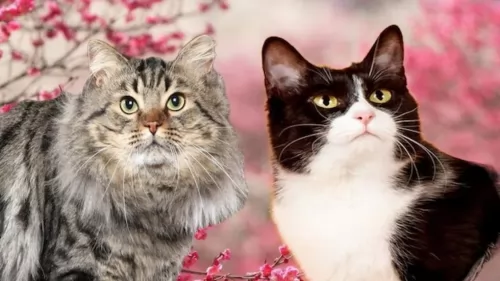 Even though the Skookum has curly hair, it’s not difficult to groom him. You want to brush the soft curls gently once a week. Keep it gentle so that you don’t make the curls frizzy.
Even though the Skookum has curly hair, it’s not difficult to groom him. You want to brush the soft curls gently once a week. Keep it gentle so that you don’t make the curls frizzy.
Use some warm water in a spray bottle with some pet conditioner and spray the curls lightly and use your fingers to liven up the curls.
Cats like to nibble throughout the day and it is better for them to feed like this as opposed to a larger meal morning and night.
However, you will need to know what your cat is eating as you don’t want to overfeed your cat. Obesity comes with a host of health issues. As a carnivore, your cat requires meaty foods so make sure to feed him high-quality cat foods that have meat and protein as the top ingredients.
Your cat must have a constant supply of fresh, cool water.
Provide your cat with a litter box. You will need to clean out the box every day of cat feces as cats don’t like to use a box that is dirty. You get special cat rakes at the vet or the pet shop that makes it easy just to rake up the feces and dispose of them.